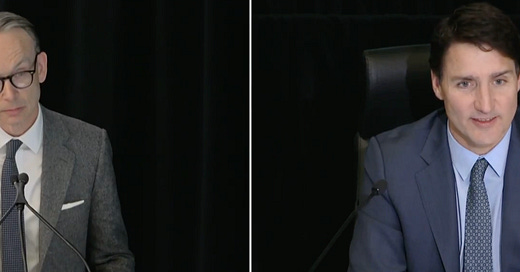ANALYSIS: After His Bombshell, Trudeau Sparred With MP Chong's Counsel On Chinese Secret Police Targeting
"Targeting Paper" findings allegedly withheld from Trudeau align with PRC efforts to undermine candidates critical of Beijing, The Bureau's analysis suggests
OTTAWA, Canada — It was a face-off between a couple of McGill University debating veterans, according to Prime Minister Justin Trudeau.
Yesterday, shortly after Trudeau dropped a bombshell in his testimony—accusing opposition leader Pierre Poilievre of ignoring foreign interference compromises involving past and present Conservative parliamentarians—MP Michael Chong’s lawyer, Gib van Ert, confronted Trudeau over his government’s alleged negligence in allowing Zhao Wei, a Chinese agent working under diplomatic cover in Toronto, to operate freely in targeting Chong.
With Chong’s lawyer and the Prime Minister talking over each other in tense exchanges, Commissioner Marie-Josée Hogue had to intervene. Trudeau smiled, saying he and Van Ert were reverting to the back-and-forth of their university debating contests.
Van Ert’s cross-examination focused on the Chinese secret police's targeting of Chong and his family in Hong Kong—a hostile act that, Van Ert argued, was similar to how Indian diplomats have been clandestinely gathering intelligence on Canadian residents, according to Trudeau’s recent disclosures, potentially for violent targeting.
Chong’s lawyer ridiculed the contention of Trudeau and his senior aides that Beijing’s retaliatory intelligence gathering against Chong—who introduced a 2021 motion condemning China’s genocide in Xinjiang—was nothing more than standard diplomacy.
“Mr. Chong does not share your confidence that his family in Hong Kong will never be coerced or harmed,” Van Ert argued. “Hong Kong is not a democracy, and it does not respect freedom of political thought.”
Van Ert prefaced his examination of Trudeau by focusing on Beijing’s feared secret police arm, the Ministry of State Security.
"You confirmed this morning that your government’s assessment of the PRC’s targeting of Michael Chong and his family in Hong Kong was not considered foreign interference, but rather lawful diplomatic activity," Van Ert said. "Sir, there were four intelligence products in 2021 concerning PRC activities directed at my client, all from CSIS. We've only seen one, which explicitly identifies multiple threat actors, including the Ministry of State Security."
The Commission has heard both Michael Chong and former Vancouver-area Conservative MP Kenny Chiu were targeted by the MSS, according to the May 2021 document. Chiu lost his seat in September 2021 to a Liberal candidate who called Chiu’s advocacy for a foreign interference bill “discriminatory policy,” while also receiving campaign support from recognized proxies of Beijing’s United Front Work Department, according to The Bureau’s investigation.
Chiu’s case is apparently considered by Canadian intelligence to be one of the most serious instances of Chinese election interference, consistent with activities described in several CSIS intelligence reports. These reports, the Commission heard, were blocked from reaching Trudeau, including the so-called “Targeting Paper” and the Privy Council Office’s “Special Report.”
In the face-off between MP Chong’s lawyer and the Prime Minister yesterday, drilling into the obvious differences between Canadian diplomatic efforts to understand foreign politicians and the activities of China’s secret police or India’s intelligence arms, Van Ert told Trudeau: "The Ministry of State Security is the PRC’s equivalent of Russia’s FSB or the Soviet Union’s KGB. We don't have anything like that. So, if a diplomat in this country is sending information about a Canadian MP to China’s spy agency, that is not lawful diplomacy. Don't you agree?"
Prime Minister Trudeau acknowledged that Zhao Wei, the Chinese intelligence actor working under diplomatic cover in Toronto, was only ejected after his alleged activities were exposed by The Globe and Mail’s 2023 reports.
"I accept that Zhao Wei was expelled because he could no longer perform his diplomatic role. But there were several factors. One, escalating tensions between Canada and China. Two, CSIS concluded he engaged in foreign interference activities, though not directly against Michael Chong."
Van Ert highlighted that CSIS had identified Zhao Wei as a candidate for expulsion as early as 2019, years before The Globe and Mail report. He argued that the Prime Minister should have been informed much earlier: “Your government let him stay, and you’ve admitted you hadn’t even heard of him until you read about him in the paper. Should someone not have informed you about his activities?”




